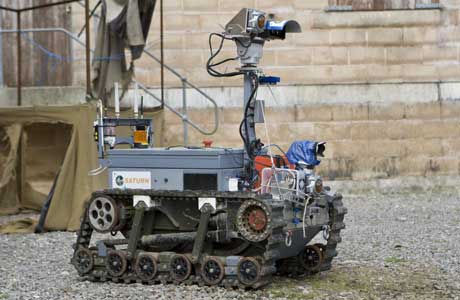Intelligent computers put to the test
Published by The Observer on 05/10/2008
Can machines think? That was the question posed by the great mathematician Alan Turing. Half a century later six computers are about to converse with human interrogators in an experiment that will attempt to prove that the answer is yes. In the 'Turing test' a machine seeks to fool judges into believing that it could be human. The test is performed by conducting a text-based conversation on any subject. If the computer's responses are indistinguishable from those of a human, it has passed the Turing test and can be said to be 'thinking'. No machine has yet passed the test devised by Turing, who helped to crack German military codes during the Second World War. But at 9am next Sunday, six computer programs - 'artificial conversational entities' - will answer questions posed by human volunteers at the University of Reading in a bid to become the first recognised 'thinking' machine. If any program succeeds, it is likely to be hailed as the most significant breakthrough in artificial intelligence since the IBM supercomputer Deep Blue beat world chess champion Garry Kasparov in 1997. It could also raise profound questions about whether a computer has the potential to be 'conscious' - and if humans should have the 'right' to switch it off. Click here for more...



 IBM says next week will see the release of a successor to the world's fastest supercomputer Blue Gene, which it claims will have the calculating capability of the average human brain. The Blue Gene/P will be capable of operating at 'petascale' speeds (one quadrillion operations per second). This a significant jump in processing power from the previous version, the Blue Gene/L which was 'only' capable of terascale speeds (one trillion operations per second).The news was announced by Nicholas M. Donofrio, IBM's soon to be retired executive vice president for Innovation and Technology, at IBM's first European Information on Demand conference in the Netherlands. He was making a speech on how innovation and the ability to transform invention into products, services, methods, processes and policies was a vital part of business in the past, present and future.
IBM says next week will see the release of a successor to the world's fastest supercomputer Blue Gene, which it claims will have the calculating capability of the average human brain. The Blue Gene/P will be capable of operating at 'petascale' speeds (one quadrillion operations per second). This a significant jump in processing power from the previous version, the Blue Gene/L which was 'only' capable of terascale speeds (one trillion operations per second).The news was announced by Nicholas M. Donofrio, IBM's soon to be retired executive vice president for Innovation and Technology, at IBM's first European Information on Demand conference in the Netherlands. He was making a speech on how innovation and the ability to transform invention into products, services, methods, processes and policies was a vital part of business in the past, present and future. 




